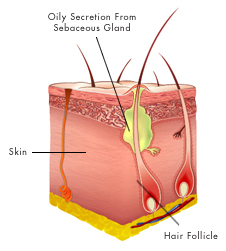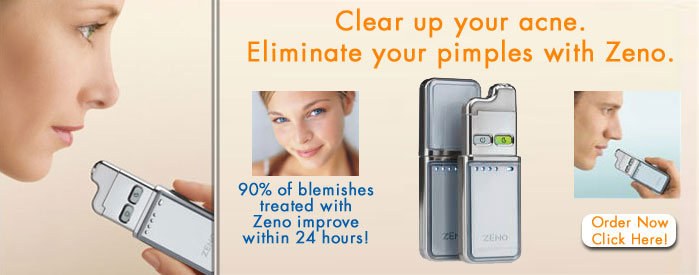About Acne
Acne is pustular eruptions, localized abscessed
formation and local inflammatory conditions of
the dermis and epidermis skin layers. Endogenous
hormones (mainly androgens), which are present
in unusually high concentrations in the blood
during adolescence and puberty give rise to an
excessive production of sebum (or oil). The condition
may worsen by a simultaneous increase in the rate
of keratin in the skin's outer layer (the horny
layer) that causes skin cell death. As the horny
cells proliferate, they can form an occlusive
plug or comedone which coupled with the increased
production of the sebum, represents an ideal medium
for the proliferation of the skin resident anaerobic
bacterium, P. acnes.
 Plugged
follicles may take the form of either whiteheads,
where the plug in the follicle remains beneath
the skin's surface, or blackheads, where
the plug in the follicle extends to the skin's
surface and becomes visible. In the majority of
these clogged follicles, the bacterium P.
acnes will cause swelling, itching, and redness
around the follicle. Plugged
follicles may take the form of either whiteheads,
where the plug in the follicle remains beneath
the skin's surface, or blackheads, where
the plug in the follicle extends to the skin's
surface and becomes visible. In the majority of
these clogged follicles, the bacterium P.
acnes will cause swelling, itching, and redness
around the follicle.
The bacterium P. acnes is normally present
in all skin types as part of the skin's sebum
maintenance system. In a hair follicle, P.
acnes produces enzymes that break down sebum
creating a balance of oil in the skin. However,
a clogged follicle creates an ideal environment
for this sebum-eating skin bacterium to multiply.
Consequently, the increase of P. acnes
and its enzymes irritates and inflames the skin
resulting in acne. Furthermore, P. acnes
is responsible for at least 90% of all acne cases.
There are many myths about what causes acne.
Stress does not cause acne, and neither does eating
greasy foods. Another common myth is that dirty
skin causes acne, but studies have shown that
blackheads and other acne lesions are not caused
by dirt.
Acne is a medical problem and requires a medical
solution.
Pimple Treatment
People of all races and ages get acne. Although
frequently thought of as a condition that affects
teenagers, adult acne is a real
problem, and some people in their forties and
fifties continue to have this skin condition.
For decades, people have experimented with and
invented all manner of treatments and medications
to clear acne, with varying degrees of success.
There are many over-the-counter
and prescription acne medications. Experts
recommend different ones for different people,
but none have been totally effective in a
large portion of the population. Most people
do not respond to traditional acne treatment.
This is especially true of adults, as most
topical acne
medications are formulated for teenaged
skin. That's why Zeno was developed -
a new device for clearing acne.
|



